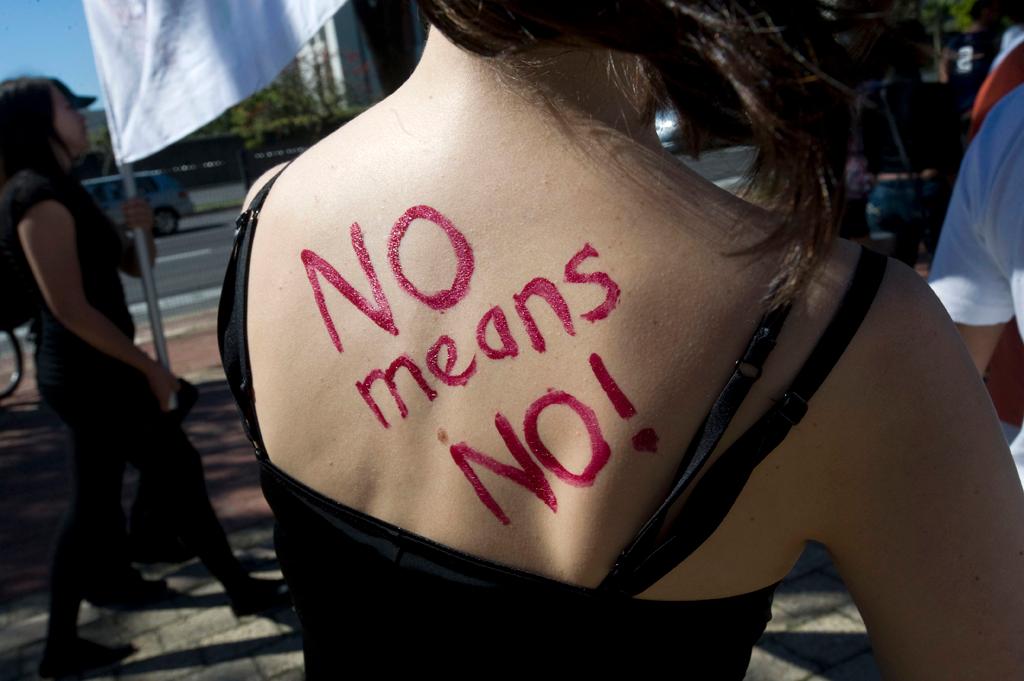South Africa’s ‘Delhi moment’
“No means No ” is written on the back of a woman protester in Cape Town, South Africa, Aug. 20, 2011.
JOHANNESBURG, South Africa — Anene Booysen was gang raped, mutilated and left for dead at a construction site in Bredasdorp, a windswept town near the southernmost tip of Africa.
When found by security guards, the 17-year-old girl was barely alive. At the hospital, she managed to identify one of her rapists before dying of her injuries. She had been eviscerated from stomach to genitals; hospital staff needed counseling to deal with the trauma after fighting a losing battle to save her life.
Booysen’s rape and murder Saturday have led to an outpouring of anger among South Africans, frustrated with a national epidemic of sexual violence. Around the country people are wondering if this might at last be a “Delhi moment,” referring to the protests that united India and the world after the violent gang rape of a 23-year-old woman on a bus late last year.
In South Africa, rape is so common it barely makes the news. The rapes of elderly women and babies are outlined in four-line stories on the inside pages of local newspapers, but most sexual assaults get no public attention.
The country has one of the highest rates of rape in the world, with some 65,000 rapes and other sexual assaults reported for the year ending in March 2012, or 127.6 per 100,000 people in the country. One in four South African men has admitted to having raped a woman, according to a widely cited study from 2009.
Despite these frightening statistics, the last significant public outcry was a year ago, when a 17-year-old mentally disabled girl from Soweto was gang raped by young men who videotaped her anguish and offered her the equivalent of 25 cents to keep quiet.
But the rape and murder of Booysen, whose ex-boyfriend is one of two young men so far charged in the attack, have drawn the attention of the country’s president. On Thursday, Jacob Zuma called on the courts to “impose the harshest sentences on such crimes, as part of a concerted campaign to end this scourge in our society.”
“The whole nation is outraged at this extreme violation and destruction of a young human life,” Zuma said in a statement. “We must never allow ourselves to get used to these acts of base criminality to our women and children.”
Andy Kawa, a South African businesswoman who attended Columbia University and has an MBA from the Wharton School, was gang raped in 2010 on a beach in the coastal town of Port Elizabeth.
She survived the 15-hour attack, and founded Kwanele, or “enough is enough,” an organization that aims to break what she calls the “conspiracy of silence” around rape in South Africa.
Kawa said rape is common at all levels of South African society, including within families where it is hushed up.
“Rape has been normalized,” she said. “It’s not a black thing, it’s not a white thing. It affects all ages and backgrounds.”
“We need a paradigm shift.”
Mbuyiselo Botha, spokesman for the Sonke Gender Justice Network, which advocates for South African men to take a stand against rape, said the government needs to “walk the talk.”
“It’s good to have politically correct statements, but is there the willingness to go a step further?”
“In South Africa, rape is taken as a norm,” he said. “Why is it not taken as a crisis?”
Botha’s organization works with men and boys to address what he called a “toxic masculinity,” made worse by the violent nature of South African society.
“The president should take the lead and say, ‘I as a South African man think this should not be done in my name.’”
While South Africa has one of the world’s most progressive constitutions, and while more than 40 percent of the country’s cabinet ministers are women, the government has been accused of neglecting the issue of rape and violence against women.
President Zuma was tried for rape in 2006, and acquitted of charges that he raped a family friend who was HIV positive. The victim was verbally abused by Zuma’s supporters as she entered and exited the courtroom.
Kawa, who is helping to lead South Africa's involvement in a Feb. 14 global march against gender violence, said that while South Africa’s constitution is famously progressive, the judicial system is out of step.
In her own gang rape case, charges against her accused assailants were dropped due to a lack of DNA evidence.
“We are the envy of the world with our constitution and bill of rights, but the justice system is not there,” she said. “My experience as a victim is that the perpetrator has more rights. They can play the system.”
“My case has fallen through the cracks of the justice system,” Kawa added. “But I’m going to make sure it doesn’t happen to anybody else.”
Every day, reporters and producers at The World are hard at work bringing you human-centered news from across the globe. But we can’t do it without you. We need your support to ensure we can continue this work for another year.
Make a gift today, and you’ll help us unlock a matching gift of $67,000!
